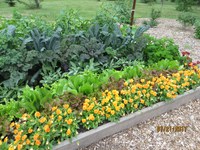NDSU Extension, Fargo Public Library Collaborate to Help Food Pantries
(Click the image below to view a high-resolution image that can be downloaded)
The North Dakota State University Extension Master Gardener Program and the Fargo Public Library are partnering to support food pantries with nutritious, fresh produce.
“COVID-19 has temporarily changed our economy,” says Esther McGinnis, NDSU Extension horticulturist. “In recent years, North Dakota has enjoyed one of the lowest unemployment rates in the country. While current unemployment rates have not been calculated, they will be sobering to even the most stoic individual. In other states, high unemployment has resulted in long lines at food pantries. According to the Great Plains Food Bank, North Dakota food pantries are reporting a 44% increase in demand.”
The Fargo Public Library intended to start a seed library for the 2020 growing season to benefit its patrons. The library, in conjunction with Friends of the Fargo Public Library, acquired vegetable seeds during the winter from reputable seed companies. Extension Master Gardeners in Cass County repackaged the seeds in small envelopes for free distribution through the library system.
However, the libraries closed due to COVID-19, which meant that the seed library could not be accessed by the public in time for spring planting. To prevent the vegetable seeds from going to waste during a time of food insecurity, the entire seed library was donated to the NDSU Extension Master Gardener Program to benefit food pantries across the state.
The Extension Master Gardener Program has distributed the seeds to 18 NDSU Extension county offices. Master Gardeners, 4-H youth and avid gardeners in those counties will sow the seeds primarily in home gardens, care for the plants and harvest the fresh vegetables for donation to local food pantries. Food safety protocols will be followed to ensure safe harvesting and handling of the produce.
“There is no evidence of food or food packaging being associated with transmission of COVID-19, according to the Food and Drug Administration,” says Julie Garden-Robinson, NDSU Extension food and nutrition specialist
“Always rinse fresh produce under running tap water, even those with peelings we do not eat,” she adds. “However, commercial salads can be used directly from the bag.”
McGinnis notes: “You do not need to be an Extension Master Gardener to help others in need. Every home gardener should consider planting an extra row or two of vegetable crops in your garden for donation to local food pantries. If you are a container gardener on your apartment balcony, consider adding an extra container. With widespread unemployment and food insecurity across the state, we will be feeding our friends and neighbors.”
Fresh vegetable crops that are in the most demand at food pantries include beans, peas, beets, carrots, cucumbers, onions, peppers, tomatoes and melons.
To find your local food pantry, consult the North Dakota Department of Agriculture (NDDA) Hunger Free Garden Project website. The NDDA has updated its online produce donation site map at https://tinyurl.com/HungerFree-ND to help gardeners and commercial producers find and support their local food pantries.
Contact Jamie Good, local foods specialist at the NDDA, to be included on the department’s Hunger Free Garden Project website.
“Vegetable donations from commercial producers are welcome, but local food pantries may not be able to handle large volumes,” Good says. “Instead, the commercial producer should contact either the Great Plains Food Bank or the North Dakota Department of Agriculture to coordinate the donation.”
NDSU Agriculture Communication - May 5, 2020
| Source: | Esther McGinnis, 701-231-7971, esther.mcginnis@ndsu.edu |
|---|---|
| Editor: | Ellen Crawford, 701-231-5391, ellen.crawford@ndsu.edu |


